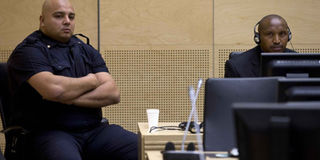War crimes suspect Ntaganda tells ICC he is innocent

Congolese war crimes suspect Bosco Ntaganda (right) is seen during his first appearance before judges of the International Criminal Court in The Hague, Netherlands, on March 26, 2013, since his surprise surrender to face charges including murder, rape pillaging and using child soldiers in eastern Congo. Mr Ntaganda told the court he was innocent. AFP PHOTO
THE HAGUE
Congolese war crimes suspect Bosco Ntaganda made his first appearance before the International Criminal Court on Tuesday, telling a judge he was innocent of charges ranging from murder and rape to using child soldiers.
The man known as "The Terminator" appeared with a shaved head, thin moustache and wearing a black suit and dark blue tie after arriving in The Hague on Friday following his surprise surrender in Rwanda.
"My name is Bosco Ntaganda, I only have the two names, the names given to me by my parents," he said when presiding judge Ekaterina Trendafilova asked him to identify himself.
"As you know, I was a soldier in the Congo," he said. "I was born in Rwanda but I grew up in the Congo. I am Congolese."
"I was informed of these crimes but I plead not guilty," Ntaganda said before Trendafilova cut him short.
"I do not want to interrupt you. The purpose of the initial appearance is a very limited one," the judge said. "You will have ample opportunities to make your point as thoroughly and necessary to the chamber."
The judge set September 23 as the date for a hearing to confirm the charges against Ntaganda, who was allegedly involved in the murder of at least 800 people in villages in the volatile DR Congo's Ituri region.
During that hearing, prosecutors must convince the court's judges they have enough evidence to take him to trial.
Ntaganda reportedly walked into the US embassy in Kigali and asked to be sent to the ICC, possibly fearing for his life as a fugitive from former comrades.
The first ever suspect to voluntarily surrender to the ICC, Ntaganda is wanted for war crimes and crimes against humanity allegedly committed a decade ago when he was a warlord in the eastern Democratic Republic of Congo.
Tuesday's brief appearance was to verify Ntaganda's identity, read the alleged crimes and his rights under the court's founding document, the Rome Statute.
Set up just over a decade ago, the ICC is the world's only permanent criminal court to try genocide, crimes against humanity and war crimes.
Ntaganda faces seven war crimes counts and three counts of crimes against humanity: they include murder, rape and using child soldiers in his rebel army as well as keeping women as sex-slaves between September 2002 and September 2003.
He was taken into custody in Kigali and flown to Rotterdam airport on Friday, since when he has been held at the ICC's detention unit in The Hague's seaside suburb of Scheveningen.
Born in 1973, Ntaganda is the fifth African in the ICC's custody and the court first issued an arrest warrant against him in 2006.
Ntaganda, more than six feet tall, is a charismatic figure.
Until his unexpected appearance in Kigali last week, he had been "flaunting his impunity like a medal of honour while engaging in ruthless human rights abuses," as Human Rights Watch's senior Africa researcher Anneke Van Woudenberg put it.
Once a top commander of the DR Congo's M23 rebels, Ntaganda is believed to have crossed into Rwanda at the weekend along with several hundred fighters after they suffered a humiliating defeat at the hands of a rival rebel faction.
Ntaganda, is believed to have been instrumental in the M23 mutiny from the Congolese army in April last year after the collapse of a peace deal under which rebels were to be integrated into the regular army.


